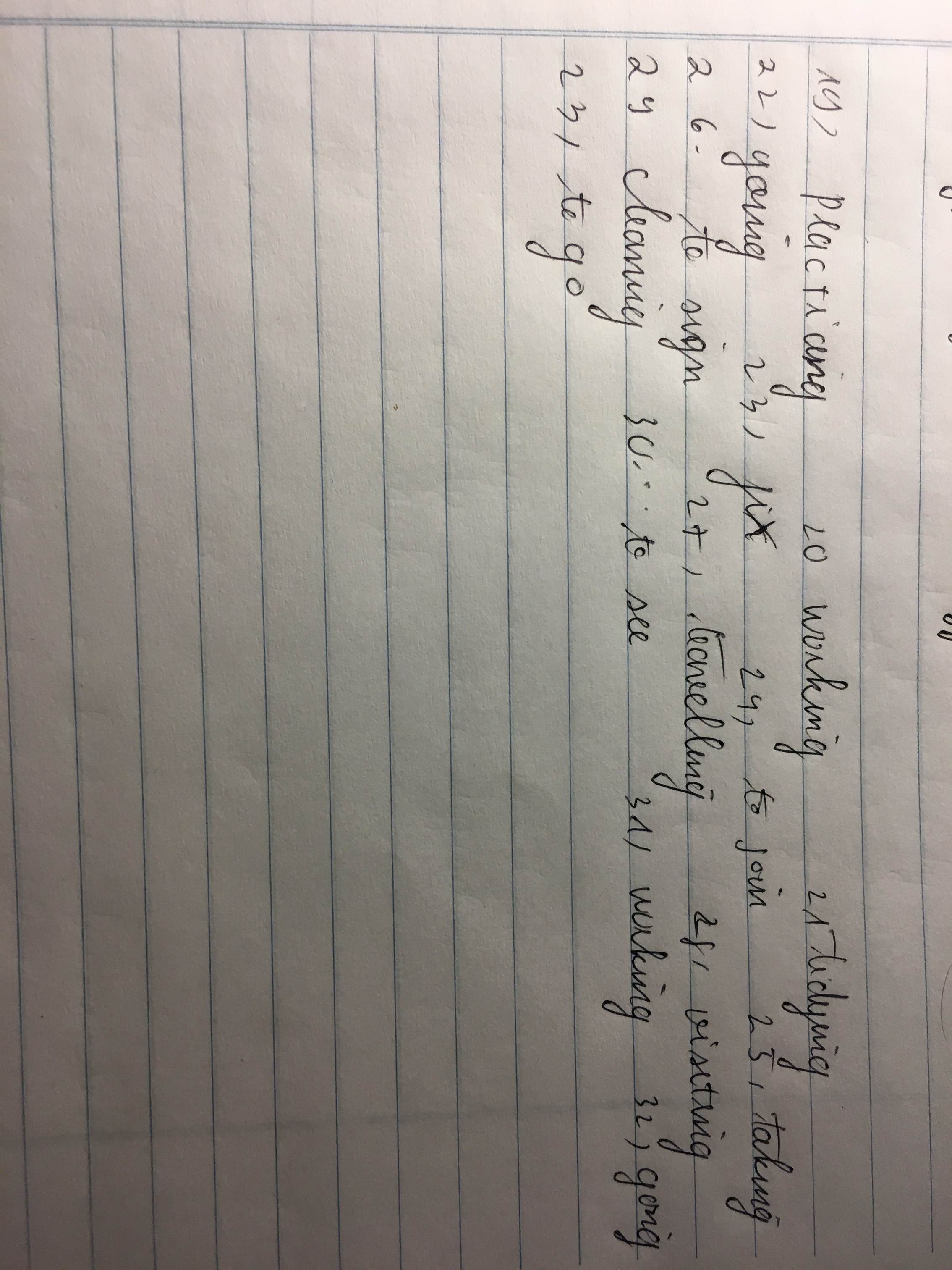The girls in class....now(write).

Những câu hỏi liên quan
the girls in class...now (write)
I. Write sentences, using the cues given in the present continuous tense.
1. Lan / play/ piano/ at the moment ……………………………………………………
2. The boys/ study/ math/ now. ………………………………………………………..
3. The girls/ learn/ how/ make/ cakes.…………………………………………………….
4. They/ have/ breakfast/ school canteen.…………………………………………………..
II. Use the correct form of the verbs in brackets to complete the passage
There (be) ………….. a library in our school. Mr. Tu (be) ………… our librarian. He (open) …………. the library a...
Đọc tiếp
I. Write sentences, using the cues given in the present continuous tense. 1. Lan / play/ piano/ at the moment …………………………………………………… 2. The boys/ study/ math/ now. ……………………………………………………….. 3. The girls/ learn/ how/ make/ cakes.……………………………………………………. 4. They/ have/ breakfast/ school canteen.………………………………………………….. II. Use the correct form of the verbs in brackets to complete the passage There (be) ………….. a library in our school. Mr. Tu (be) ………… our librarian. He (open) …………. the library at 7:00 and (close) ………..it at 11:00. Students often (come) ……..to the library (read) ……….. books. He (be) ……… in the library at the moment. Some students (borrow) ………. some books. Others (sit) ……… at the table in the middle of the room and (read) ……..the books they want. The library (be) ……….very helpful in (develop) …….. the children’s love for books and their habit of (read) ……………… III. Complete the sentences with prepositions: The magazine are …………… the shelves ……………. the right. Those books ………. the back …….. the library are …… English. When I go to the library, I sit and read ………… wonderful things. The science books are ……… the rack …. the corner of the room. It’s easy to find a book ……………… the title.
1. Lan / play/ piano/ at the moment ………Lan is playing the piano at the moment……………………………………………
2. The boys/ study/ math/ now. ……The boys are studying math now…………………………………………………..
3. The girls/ learn/ how/ make/ cakes.…THe girls are learning how to make cakes………………………………………………….
4. They/ have/ breakfast/ school canteen.They are having breakfast at the school canteen…………………………………………………..
II. Use the correct form of the verbs in brackets to complete the passage
There (be) …is……….. a library in our school. Mr. Tu (be) …is……… our librarian. He (open) ……opens……. the library at 7:00 and (close) …closes……..it at 11:00. Students often (come) …come…..to the library (read) ……to read….. books. He (be) …is…… in the library at the moment. Some students (borrow) ……are borrowing…. some books. Others (sit) ……are sitting… at the table in the middle of the room and (read) reading……..the books they want. The library (be) ……is….very helpful in (develop) ……developing.. the children’s love for books and their habit of (read) ……reading………… III. Complete the sentences with prepositions: The magazine are ………on…… the shelves ……to………. the right. Those books ……at…. the back …of….. the library are …in… English. When I go to the library, I sit and read …about……… wonderful things. The science books are …on…… the rack …at. the corner of the room. It’s easy to find a book ……by………… the title.
Đúng 1
Bình luận (0)
Review: Fill in the present continuous. usr the verbs in brackets.1. Im busy now because I_____the house. (clean)2. _____ they _____ lunch? (prepare)3. The girls _____ an email to their friend. (write)4. Her friends _____ in the park. (not play)5. They _____ his birthday. (celebrate)6. Do you have time to talk? Sorry, but I _____. (study)7. Peter _____ his best friend. (phone)8. He _____ a green basball cap. (wear)9. They _____ for the key. (look)10. Hurry! The bus _____. (come)11. He _____ his...
Đọc tiếp
Review: Fill in the present continuous. usr the verbs in brackets.
1. I'm busy now because I_____the house. (clean)
2. _____ they _____ lunch? (prepare)
3. The girls _____ an email to their friend. (write)
4. Her friends _____ in the park. (not play)
5. They _____ his birthday. (celebrate)
6. Do you have time to talk? Sorry, but I _____. (study)
7. Peter _____ his best friend. (phone)
8. He _____ a green basball cap. (wear)
9. They _____ for the key. (look)
10. Hurry! The bus _____. (come)
11. He _____ his teeth. (clean)
12. Why _____ you _____? (laugh)
13. Please listen to me. I _____ to you. (talk)
14. Frank and Mary _____at the party. (dance)
15. She _____ her presents. (open)
1 am cleaning
2 Are they preparing
3 are writing
4 aren't playing
5 are celebrating
6 am studying
7 is phoning
8 is wearing
9 are looking
10 is coming
11 is cleaning
12 are - laighing
13 am talking
14 are dancing
15 is opening
Đúng 3
Bình luận (0)
VII. Read the passage carefully, then choose the correct answer.In Britain there is a holiday now which people call Mother’s Day. In the old days many girls from working-class families in towns and cities and from farmers’ families in the country worked in rich houses.Once a year, it was usually on Sunday in March, they were allowed to visit their mothers. They went home and brought presents for their mothers and for other members of their families. People call that day Mothering Day or Motherin...
Đọc tiếp
VII. Read the passage carefully, then choose the correct answer.
In Britain there is a holiday now which people call Mother’s Day. In the old days many girls from working-class families in towns and cities and from farmers’ families in the country worked in rich houses.
Once a year, it was usually on Sunday in March, they were allowed to visit their mothers. They went home and brought presents for their mothers and for other members of their families. People call that day Mothering Day or Mothering Sunday. Mothering Day later became Mother’s Day. It is the last Sunday in March.
In 1914, President Woodrow Wilson and Congress agreed that the second Sunday in May should be observed as Mother’s Day in America. On that day, children give their mothers flowers, presents and cards to show their love to their mothers. Americans spend millions of dollars to buy Mother’s Day gifts. Clothes, perfume, jewelry and books or tickets to theater are given to mothers. People who cannot be with their mothers on that day usually send them presents and call them on the phone.
26. In the United States, Mother’s Day has been celebrated .........................
A. on the second Sunday in May B. on Sunday in March
C. in 1914 D. the last Sunday in March.
27. Americans usually ..................................
A. allow to visit their mothers. B. offer gifts to their mothers on Mother’s Day.
C. call their mothers on the phone. D. spend hundred of dollars to buy Mother’s Day gifts.
28. People who cannot visit their mothers on Mother’s Day often .....................
A. bring presents for their mothers. B. give their mothers money.
C. go shopping with their mothers. D. phone to talk to them.
29. According to the passage, Mother’s Day is.......................in Britain.
A. the last Sunday in May B. the second Sunday in May
C. the last Sunday in March D. the first Sunday in March
30. What does the passage mainly discuss?
A. A day children give someone flowers, presents and cards.
B. A day when servants couldn’t return home to visit their mothers.
C. A day children show their love to their mothers and fathers
D. A day to honor mothers and motherhood
In Britain there is a (1)_________ now which people call Mother’s Day. In the old days many girls from working-class families in towns and cities and from farmers’ families in the country worked in rich houses. They had to do all the (2)_________ and their working day was usually very long, they often (3)_________ on Sundays, too. Once a year, it was usually one Sunday in March, they could (4)_________ their mothers. They went home on that day and (5)_________ presents for their mothers and for...
Đọc tiếp
In Britain there is a (1)_________ now which people call Mother’s Day. In the old days many girls from working-class families in towns and cities and from farmers’ families in the country worked in rich houses. They had to do all the (2)_________ and their working day was usually very long, they often (3)_________ on Sundays, too. Once a year, it was usually one Sunday in March, they could (4)_________ their mothers. They went home on that day and (5)_________ presents for their mothers and for (6)_________ members of their families. They could stay at home only one day, and then they went back (7)_________their work. People call that day Mothering Day (8)_________Mothering Sunday.
Later workers at the (9)_________ and girls who worked in the houses of rich families received one free day a week, and Mothering Day became Mother’s Day. It is (10)_________ last Sunday in March.
holiday
housework
worked
visit
brought
other
to
or
factories
the
Đúng 5
Bình luận (0)
In Britain there is a (1)___holiday______ now which people call Mother’s Day. In the old days many girls from working-class families in towns and cities and from farmers’ families in the country worked in rich houses. They had to do all the (2)___housework______ and their working day was usually very long, they often (3)___worked______ on Sundays, too. Once a year, it was usually one Sunday in March, they could (4)____visit_____ their mothers. They went home on that day and (5)____brought_____ presents for their mothers and for (6)___other______ members of their families. They could stay at home only one day, and then they went back (7)___to______their work. People call that day Mothering Day (8)____or_____Mothering Sunday.
Later workers at the (9)___factories______ and girls who worked in the houses of rich families received one free day a week, and Mothering Day became Mother’s Day. It is (10)____the_____ last Sunday in March.
Đúng 2
Bình luận (0)
In Britain there is a (1)….. now which people call Mother’s Day. In the old days, many girls from working-class (2)…. in towns and cities and from farmers’ families in the country worked in rich houses. They had to do all the (3)….. and their working day was usually very long, they often worked on (4)….., too. Once a year, it was usually (5)….. Sunday in March, they could visit their mothers. They went home on that day and (6)…. presents for their mothers and for other members of their families....
Đọc tiếp
In Britain there is a (1)….. now which people call Mother’s Day. In the old days, many girls from working-class (2)…. in towns and cities and from farmers’ families in the country worked in rich houses. They had to do all the (3)….. and their working day was usually very long, they often worked on (4)….., too. Once a year, it was usually (5)….. Sunday in March, they could visit their mothers. They went home on that day and (6)…. presents for their mothers and for other members of their families. They could stay at home only one day, and (7)…… they went back to their work. People call that day Mothering Day or Mothering (8)…… . Later, workers at the factories and girls who worked in the houses of rich families received one (9)… day a month, and Mothering Day became Mother’s Day. It (10)….. the last Sunday in March
Làm và giải thích luôn đc không ạ :< . Mình đang cần gấpp
In Britain there is a (1) holiday now which people call Mother’s Day. In the old days many girls from working-class (2) families in town and cities and from farmers’ families in the country work in rich houses. They had to do all the (3) housework and their working day was usually very long. They often worked on (4) Sundays, too. Once a year, it was usually (5) on Sunday in March, they could visit their mothers. They went home on that day and (6) brought presents for their mothers and for other members of their families. They could stay at home only one day, and (7) then went back to their work. People call that day Mothering Day or Mothering (8) Sunday. Later, workers at the factories and girls who worked in the houses of rich families received one (9) free day a month, and Mothering Day became Mother’s Day. It (10) is the last Sunday in March.
Đúng 0
Bình luận (0)
Question 3: Fill each of the numbered blanks in the following passage. Use only ONE word in each space.In Britain there is a …..1….. now which people call Mother’s Day. In the old days, many girls from working-class ….2…. in towns and cities and from farmers’ families in the country worked in rich houses. They had to do all the ….3….. and their working day was usually very long, they often worked on …..4….., too. Once a year, it was usually ……5….. Sunday in March, they could visit their mothers...
Đọc tiếp
Question 3: Fill each of the numbered blanks in the following passage. Use only ONE word in each space.
In Britain there is a …..1….. now which people call Mother’s Day. In the old days, many girls from working-class ….2…. in towns and cities and from farmers’ families in the country worked in rich houses. They had to do all the ….3….. and their working day was usually very long, they often worked on …..4….., too. Once a year, it was usually ……5….. Sunday in March, they could visit their mothers. They went home on that day and ……6…. presents for their mothers and for other members of their families. They could stay at home only one day, and ……7…… they went back to their work. People call that day Mothering Day or Mothering ……8…… . Later, workers at the factories and girls who worked in the houses of rich families received one …..9… day a month, and Mothering Day became Mother’s Day. It ….10….. the last Sunday in March.
1holiday
2family
3housework
4Sundays
5on
6give
7then
8Sunday
9free
10is
Đúng 3
Bình luận (6)
My daughter.Jane, never dreamed of receiving a letter from a girl of her own age in Holland. Last year, we were traveling across the channel and Jane put a piece of paper with her name and address on it into a bottle. She threw the bottle into the sea .She never thought of it again, but ten months later she received a letter from a girl in Holland.Both girls write to each other regularly now, However, they have decided to use the post office. Letters will cost a little more, but they will certai...
Đọc tiếp
My daughter.Jane, never dreamed of receiving a letter from a girl of her own age in Holland. Last year, we were traveling across the channel and Jane put a piece of paper with her name and address on it into a bottle. She threw the bottle into the sea .She never thought of it again, but ten months later she received a letter from a girl in Holland.Both girls write to each other regularly now, However, they have decided to use the post office. Letters will cost a little more, but they will certainly travel faster.
1.Did Jane dream of receiving a letter from a friend in Holland
-
2.When did Jane cross the channel?
-
3.What did she threw into the sea?
-
4.What did it contain?
-
5.Do the two girls write to each other regularly now?
-
6.Why do they decide to use the post office?
-
My daughter.Jane, never dreamed of receiving a letter from a girl of her own age in Holland. Last year, we were traveling across the channel and Jane put a piece of paper with her name and address on it into a bottle. She threw the bottle into the sea .She never thought of it again, but ten months later she received a letter from a girl in Holland.Both girls write to each other regularly now, However, they have decided to use the post office. Letters will cost a little more, but they will certainly travel faster.
1.Did Jane dream of receiving a letter from a friend in Holland
-No, she didn't
2.When did Jane cross the channel?
-last year
3.What did she threw into the sea?
-She threw the bottle into the sea
4.What did it contain?
-a piece of paper with her name and address
5.Do the two girls write to each other regularly now?
-yes
6.Why do they decide to use the post office?
-Letters will cost a little more, but they will certainly travel faster.
Đúng 0
Bình luận (0)
My daughter.Jane, never dreamed of receiving a letter from a girl of her own age in Holland. Last year, we were traveling across the channel and Jane put a piece of paper with her name and address on it into a bottle. She threw the bottle into the sea .She never thought of it again, but ten months later she received a letter from a girl in Holland.Both girls write to each other regularly now, However, they have decided to use the post office. Letters will cost a little more, but they will certainly travel faster.
1.Did Jane dream of receiving a letter from a friend in Holland
- No, she didn't
2.When did Jane cross the channel?
- Jane crossed the channel last year
3.What did she threw into the sea?
- She threw the bottle into the sea
4.What did it contain?
- It contained a piece of paper with her name and address
5.Do the two girls write to each other regularly now?
- Yes, they do
6.Why do they decide to use the post office?
- Because letters will certainly travel faster
Đúng 0
Bình luận (0)
Put the verb into the correct form.19. The girls enjoy (practice) ______ fitness exercises after class. 20. We really like (work) ______ in the school Y&Y. 21. Are you free now? - No. Im busy (tidy) ______ the room. 22. I suggest (go) ______ camping at the weekend. 23. Can you help me (fix) ______ the lamp?24. It is interesting (join) ______ in the Y&Y group. 25. He joins in the Y&Y because he likes (take) ______ part in social activities.26. Please give the form to your parents and ask them (si...
Đọc tiếp
Put the verb into the correct form.
19. The girls enjoy (practice) ______ fitness exercises after class.
20. We really like (work) ______ in the school Y&Y.
21. Are you free now? - No. I'm busy (tidy) ______ the room.
22. I suggest (go) ______ camping at the weekend.
23. Can you help me (fix) ______ the lamp?
24. It is interesting (join) ______ in the Y&Y group.
25. He joins in the Y&Y because he likes (take) ______ part in social activities.
26. Please give the form to your parents and ask them (sign) ______ it.
27. I don't mind (travel) ______ by train.
28. I enjoy (visit) ______ other countries.
29. Have you finished (clean) ______ the kitchen?
30. Good bye. I hope (see) ______ you again soon.
31. You must stop (work) ______ so hard. It's bad for you.
32. The weather is very nice, so I suggest (go) ______ for a walk.
33. I'm tired. I want (go) ______ to bed.





























